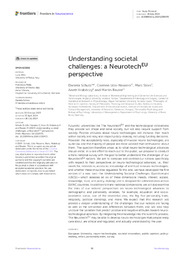Resumen :
Futuristic universities like The NeurotechEU and the technological innovations
they provide will shape and serve society, but will also require support from
society. Positive attitudes about neuro-technologies will increase their reach
within society and may also impact policy-making, including funding decisions.
However, the acceptability rates, especially of invasive neuro-technologies, are
quite low and the majority of people are more worried than enthusiastic about
them. The question therefore arises as to what neuro-technological advances
should entail. In a rare eort to reach out to the public, we propose to conduct
a trans-national survey with the goal to better understand the challenges of our
NeurotechEU nations. We aim to compare and contrast our nations specifically
with respect to their perspectives on neuro-technological advances, i.e., their
needs for, interests in, access to, knowledge of and trust in neuro-technologies,
and whether these should be regulated. To this end, we have developed the first
version of a new tool—the Understanding Societal Challenges Questionnaire
(USCQ)—which assesses all six of these dimensions (needs, interest, access,
knowledge, trust, and policy-making) and is designed for administration across
EU/AC countries. In addition to trans-national comparisons, we will also examine
the links of our nations’ perspectives on neuro-technological advances to
demographic and personality variables, for example, education and socio-
economic status, size of the residential area, the Big Five personality traits,
religiosity, political standings, and more. We expect that this research will
provide a deeper understanding of the challenges that our nations are facing
as well as the similarities and dierences between them, and will also help
uncover the variables that predict positive and negative attitudes toward neuro-
technological advances. By integrating this knowledge into the scientific process,
The NeurotechEU may be able to develop neuro-technologies that people really
care about, are ethical and regulated, and actually understood by the user.
|

 La licencia se describe como: Atribución-NonComercial-NoDerivada 4.0 Internacional.
La licencia se describe como: Atribución-NonComercial-NoDerivada 4.0 Internacional.
.png)